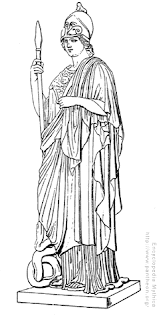Gray-eyed Athena sent them a favorable breeze, a fresh west wind, singing over the wine-dark sea. – Homer, The Odyssey
My friend, literary agent Wendy Lawton, recently wrote an intriguing post wondering about her own obsolescence. It is an honest and open look at the current state of affairs in traditional publishing and what that could mean for agents in the future.
This prompted a few musings of my own, from a writer's point of view. To begin, I dip into the realm of myth.
The traditional publishing industry has long been a Forbidden Kingdom. Writers on their journey toward publication had almost no hope of entering the gates alone. They had to find someone willing to show them the way, someone with influence within the walls.
Enter the agent as mentor. That word comes from a character in The Odyssey who guides Telemachus through the dark world. It turns out later that Mentor is really the goddess Athena in disguise. She has special powers to help, and so do agents seeking to get writers their own set of keys to the Kingdom.
But here is the question: what if a new kingdom is discovered by Telemachus? And what if access to this kingdom is open to all? Does Telemachus need his Mentor anymore?
If he still wishes to enter the Forbidden Kingdom, the answer is yes. But there have been reports flown out via carrier pigeon that this Kingdom is in turmoil. There is chaos and infighting and confusion and bonfires. At the same time, word is that in the new kingdom a revolution is underway. It has no walls or gatekeepers. Writers are dancing through tulips and earning gold sovereigns all by themselves.
Why should Telemachus tarry outside the forbidden walls when he can join that dance on the other side of the river?
This is the question of the moment for writers: pursue the "forbidden kingdom" of traditional publication? Or go join the rebels?
If the former, which is certainly a free and legitimate choice, you need a mentor, a guide. You need someone who: knows who is buying what, can brainstorm a project with you, can negotiate a contract, can collect your money, can buck you up when you're down, can feed you valuable information about the industry.
If you decide to go solo, you will need to fill your own gaps in "quality control," and believe me, you'll have them. You're on your own, and not every adventure into the forest ends happily. Start the journey with your eyes wide open.
As e-books continue toward becoming the primary delivery system (you no doubt saw that Amazon sold four times the number of Kindles on Black Friday this year than they did last year). agents become crucially important in the negotiation of contracts. For example, the agent should fight against draconian option and non-compete clauses. There should be real give and take with a publisher, keeping the long view and the writer's best interests in mind.
But as we all know the traditional publishing industry faces challenges of major proportions, and that has affected agents. Advances are low and not as many deals are being struck. Thus, some agents have become de facto publishers, which has raised concerns about conflict of interest. Others are actively seeking to secure the best e-rights options for their clients.
Agents are human. Not all of them are good. I'm fortunate in that my own agent, and the agents I know personally, are superb professionals. But there are lemons out there, so know this: having no agent is better than having a bad agent. And the best agents will see the value in the author having a platform-building presence on the indie publishing side of the valley.
Like everyone else in the publishing game, agents are going to have to explore ways to adapt to the increasing rate of change. But they will continue to have a role to play because traditional publishing still exists.
What do you think the future holds for agents?

0 comments:
Post a Comment